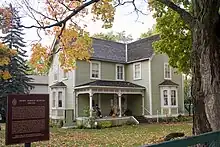Gravenhurst | |
|---|---|
| Town of Gravenhurst | |
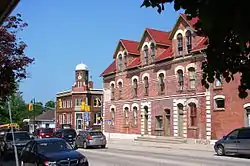 Gravenhurst Main street | |
| Motto: Wealth & Industry | |
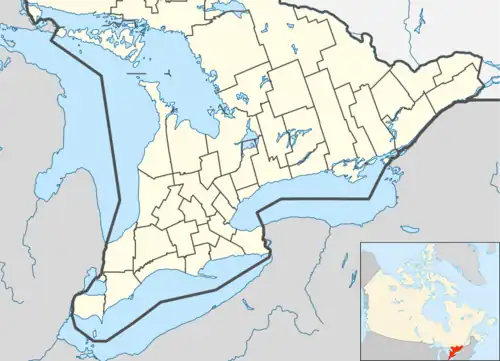 Gravenhurst | |
| Coordinates: 44°55′N 79°22′W / 44.917°N 79.367°W | |
| Country | Canada |
| Province | Ontario |
| District | Muskoka |
| Government | |
| • Mayor | Heidi Lorenz |
| • Federal riding | Parry Sound-Muskoka |
| • Prov. riding | Parry Sound—Muskoka |
| Area | |
| • Land | 489.11 km2 (188.85 sq mi) |
| Population (2021)[2] | |
| • Total | 13,157 |
| • Density | 26.9/km2 (70/sq mi) |
| Time zone | UTC-5 (EST) |
| • Summer (DST) | UTC-4 (EDT) |
| Forward sortation area | |
| Area code | 705 & 249 |
| Highways | |
| Website | www.gravenhurst.ca |
Gravenhurst is a town in the Muskoka Region of Ontario, Canada. It is located approximately 15 kilometres (9.3 mi) south of Bracebridge, Ontario. The Town of Gravenhurst includes a large area of the District of Muskoka, known to Ontarians as "cottage country." The town centre borders on two lakes: Lake Muskoka, which is the largest lake in the region, and Gull Lake, a smaller cottage-bordered lake. Another lake, Kahshe Lake, is situated 10 kilometres (6.2 mi) south of the town.
History
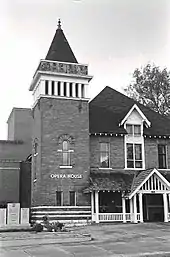
Gravenhurst was first known as McCabes Landing and later as Sawdust City. Gravenhurst was named by a postal official who was reading Gravenhurst or Thoughts on Good and Evil, a treatise by William Smith.
Gravenhurst's economic prosperity stemmed from the construction of a colonization road in the 1850s. Steamboating on the Muskoka lakes began in the 1860s. The town was located strategically at the northern terminus of the Toronto, Simcoe and Muskoka Junction Railway. The town is positioned as the "Gateway to Muskoka".[3]
Nearby Muldrew Lake was named after the lake's second cottager, Dr. William Hawthorne Muldrew. He was the principal of the first Gravenhurst high school in 1894. In 1901 he published a book called Sylvan Ontario, A Guide to Our Native Trees and Shrubs. It was the first book published on this subject in Ontario, and the drawings were his own. All the different types of trees and shrubs of Muskoka could be seen at the school, as he transplanted many of the specimens from Muldrew Lake.
In 1942 the Royal Norwegian Air Force moved their training camp (Little Norway) from Toronto to Muskoka airfield near Gravenhurst. The Norwegians remained in Gravenhurst almost to the end of World War II in 1945.[4]
Camp 20
Between 1940 and 1946 Gravenhurst was home to a German prisoner-of-war camp known as Camp 20. The camp is also referred to as Camp Calydor and Muskoka Officer’s Club. Many describe Camp 20 as a vacation for the prisoners of war. The camp had a swimming area fenced in on Lake Muskoka where the prisoners could bathe. By the end of the first summer, Camp 20 held 489 prisoners. They were taken around Gravenhurst to work on various projects. The prisoners of war built a set of stone steps leading down to the waterfront which can still be seen at Gull Lake Park today. They also built a light house in the park.
The camp had its own gardens where the prisoners would grow their own vegetables and they were able to smoke sausages from the local animals. Some prisoners of war said that they became friends with the guards who sought to make the place as friendly as possible to avoid escapes. Many prisoners had the opportunity to work outside of the camp and lumber camps and received a small wage as well as access to the outside world. Through this access to the outside world many German prisoners of war had love affairs with the local girls.
Ulrich Steinhilper, a German fighter ace who shot down five RAF airplanes during the Battle of Britain before himself being shot down, was one of the prisoners here; he made at least five attempts to escape from various camps, his last two attempts being at Gravenhurst.
Today, all that remains of Camp 20 is concrete pillars, a fire hydrant, and the outline of a fence. There is an information kiosk at the end of Lorne Street where visitors can go to get more information on the camp.[5]
Original townships
The Town of Gravenhurst includes these original townships from the 1800s:
- Wood Township (eastern half)
- Morrison Township
- Ryde Township
- Muskoka Township
Demographics
| Year | Pop. | ±% |
|---|---|---|
| 1871 | 400 | — |
| 1881 | 1,015 | +153.8% |
| 1891 | 1,848 | +82.1% |
| 1901 | 2,146 | +16.1% |
| 1911 | 1,624 | −24.3% |
| 1921 | 1,478 | −9.0% |
| 1931 | 1,864 | +26.1% |
| 1941 | 2,122 | +13.8% |
| 1951 | 3,005 | +41.6% |
| 1961 | 3,077 | +2.4% |
| 1971 | 7,133 | +131.8% |
| 1981 | 8,532 | +19.6% |
| 1991 | 9,988 | +17.1% |
| 2001 | 10,899 | +9.1% |
| 2006 | 11,046 | +1.3% |
| 2011 | 12,055 | +9.1% |
| 2016 | 12,311 | +2.1% |
| 2021 | 13,157 | +6.9% |
| Note: 2011 census population corrected by Statistics Canada[6] | ||
In the 2021 Census of Population conducted by Statistics Canada, Gravenhurst had a population of 13,157 living in 5,496 of its 8,271 total private dwellings, a change of 6.9% from its 2016 population of 12,311. With a land area of 489.11 km2 (188.85 sq mi), it had a population density of 26.9/km2 (69.7/sq mi) in 2021.[7]
| 2021 | 2016 | 2011 | |
|---|---|---|---|
| Population | 13,157 (+6.9% from 2016) | 12,311 (+2.1% from 2011) | 12,055[6] (+5.9% from 2006) |
| Land area | 489.11 km2 (188.85 sq mi) | 518.06 km2 (200.02 sq mi) | 518.59 km2 (200.23 sq mi) |
| Population density | 26.9/km2 (70/sq mi) | 23.8/km2 (62/sq mi) | 23.2/km2 (60/sq mi) |
| Median age | 53.6 (M: 52.0, F: 55.2) | 52.5 (M: 51.4, F: 53.9) | |
| Private dwellings | 8,271 (total) 5,496 (occupied) | 8,302 (total) | 8,202[6] (total) |
| Median household income | $73,500 | $59,648 |
In 2006, Gravenhurst's population was 95.6% white, 2.0% Aboriginal and 2.4% visible minorities.[11]
Age Structure [11]
- 0–14 years: 14.6%
- 15–64 years: 64.3%
- 65 years and over: 21.1%
Transportation
Gravenhurst also declares itself the "Gateway to the Muskoka Lakes" and has a large gate bearing this message hanging over Muskoka District Road 169, the main road leading into town from Highway 11. The gate had been removed but was rebuilt in 2009 and stands again at the south end of town. It is the home port of the RMS Segwun, the oldest vessel powered by a working steam engine in North America.
Ontario Northland Motor Coach Services provides inter-city bus service to Gravenhurst along its Toronto to North Bay routes. The nearby Muskoka Airport has scheduled flights to Billy Bishop Toronto City Airport and also serves general aviation.
The former Gravenhurst railway station was served by Ontario Northland Railway's Northlander passenger train until the train was discontinued in 2012, it is now a railway museum.
Attractions
Parts of the Queen Elizabeth II Wildlands Provincial Park and Torrance Barrens Conservation Reserve are in Gravenhurst.
The Muskoka Wharf
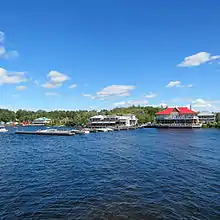
The Muskoka Wharf, located on Lake Muskoka, was completed in 2005. The project cost $170 million and spreads across 89 acres. Before the new development was built, the wharf used to be used for lumber and boat building industries.[13] It was also the entry point to the lakes. Years ago, a train would arrive at the wharf three times a day with passengers coming to Muskoka looking to settle.
Today, the wharf is full of retailers and restaurants like Boston Pizza and the Blue Willow Tea Shop. The wharf hosts a number of events in the summer including Pirate Fest and the Gravenhurst farmers’ market. There are also condominiums and a Marriott hotel for those looking to spend some time in Gravenhurst.[13]
Winter Carnival
Every year Gravenhurst has a winter carnival for the community to enjoy. There are events for every age at the carnival including donut eating contests, sno-yoga, ball hockey, a polar dip, and arm wrestling. The town has several dances for anyone ages nineteen and older as well as fireworks on Sunday for the closing ceremony. The fireworks take place at the Muskoka Wharf.[14]
Education
Located on the shore of Lake Muskoka since 1949 Gravenhurst had been home to the Ontario Fire College. The College was run by the Province of Ontario, under the Fire Marshall's Office, and offered training and education programs which were based on the Ontario Fire Service Standards. Courses were available to members of any Ontario municipal fire department, whether full-time or volunteer. The Ontario Fire College was closed by the Progressive Conservative government on March 31, 2021.
Public education consists of Gravenhurst High School, and three elementary schools administered by the Trillium Lakelands District School Board.[15]
Notable residents
- Dr. Norman Bethune (1890–1939), a physician who was born in Gravenhurst (his family's home there, known as Bethune Memorial House, has been preserved as a Canadian National Historic Site).
- Steve Barnes (born 1970), a former professional hockey defenceman who won the BH Cup as a member of the Manchester Storm.
- Graeme Murray (born 1984), a Paralympic medalist and World Champion with the Men's National Para-Ice Hockey Team.
See also
References
- ↑ "Gravenhurst census profile". 2011 Census of Population. Statistics Canada. 8 February 2012. Retrieved 2012-03-08.
- ↑ "Census Profile, 2021 Census: Gravenhurst, Town". Statistics Canada. 9 February 2022. Retrieved February 9, 2022.
- ↑ "Founding of Gravenhurst". Ontario Heritage Trust. Retrieved June 21, 2019.
- ↑ Per Conradi Hansen, Little Norway - A message of Liberty to the Hills of Home, ISBN 978-82-997663-0-2
- ↑ "Canada's Posh POW Camps (video)". CBC Digital Archives. 2012. Retrieved February 20, 2013.
- 1 2 3 "Corrections and updates". Statistics Canada. 2012-10-24. Retrieved 2012-11-11.
- ↑ "Population and dwelling counts: Canada, provinces and territories, census divisions and census subdivisions (municipalities), Ontario". Statistics Canada. February 9, 2022. Retrieved March 30, 2022.
- ↑ "2021 Community Profiles". 2021 Canadian Census. Statistics Canada. February 4, 2022. Retrieved 2023-10-19.
- ↑ "2016 Community Profiles". 2016 Canadian Census. Statistics Canada. August 12, 2021. Retrieved 2017-03-16.
- ↑ "2011 Community Profiles". 2011 Canadian Census. Statistics Canada. March 21, 2019. Retrieved 2012-03-08.
- 1 2 3 "2006 Community Profiles". 2006 Canadian Census. Statistics Canada. August 20, 2019.
- ↑ "2001 Community Profiles". 2001 Canadian Census. Statistics Canada. July 18, 2021.
- 1 2 "The Muskoka Wharf in Gravenhurst". Muskoka Tourism. 21 August 2018. Retrieved June 21, 2019.
- ↑ "Gravenhurst Winter Carnival". Muskoka Tourism. Retrieved June 21, 2019.
- ↑ "Schools". Trillium Lakelands District School Board. Archived from the original on March 27, 2012. Retrieved March 29, 2012.
External links
 Gravenhurst travel guide from Wikivoyage
Gravenhurst travel guide from Wikivoyage- Official website
